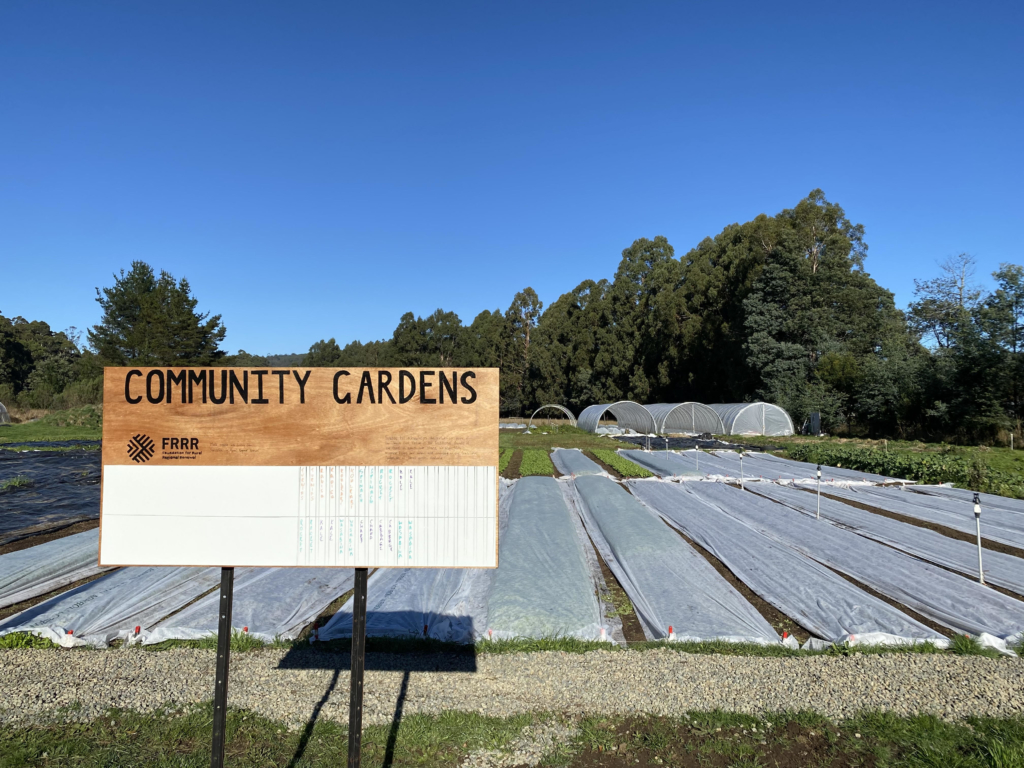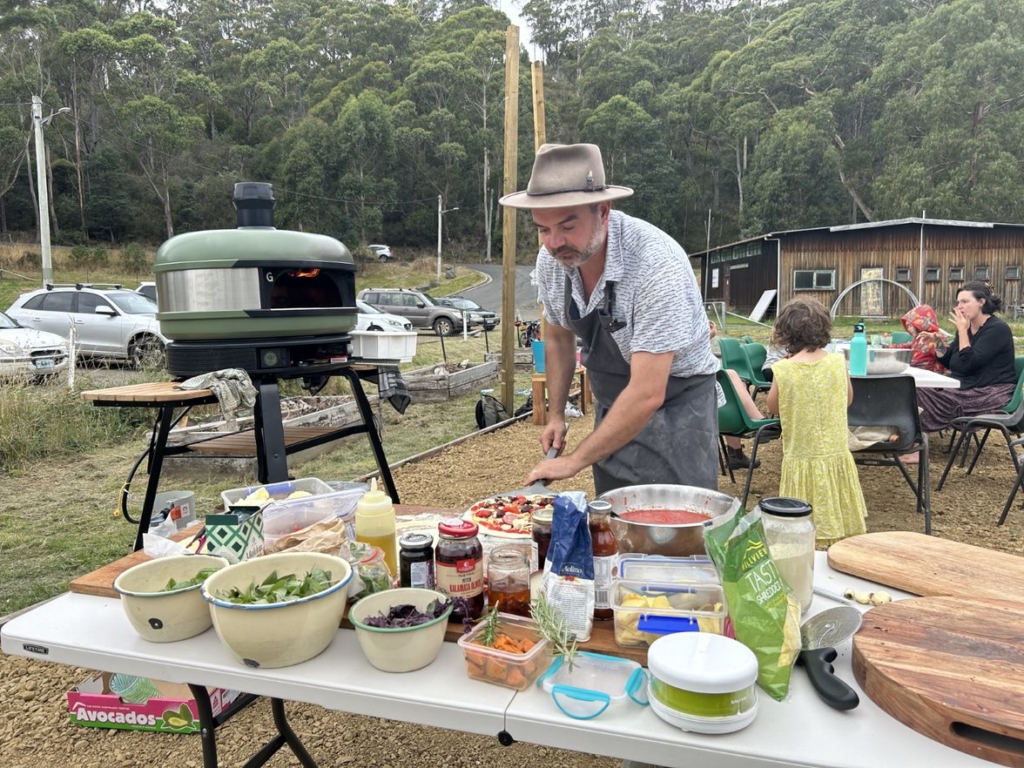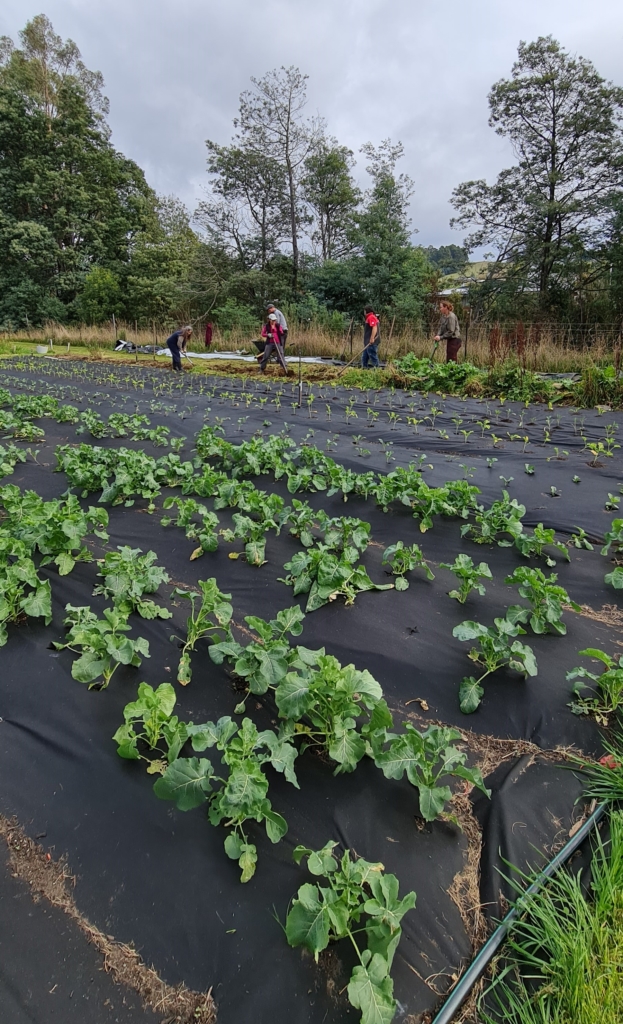Foundation for Rural & Regional Renewal (FRRR)
The 2019-20 bushfires caused immense devastation, with more than 54% of East Gippsland burnt, resulting in the loss of homes, livelihoods and infrastructure. Thousands of people were displaced, many farms and businesses lost equipment and livestock, resulting in some people losing both their homes and their jobs overnight. The community was left reeling. In the immediate aftermath, Bairnsdale Neighbourhood House (BNH) sprang into action, providing essential meals and support at Emergency Relief Centres and Community Recovery events. However, BNH was ill-equipped to meet the growing demand, relying on an inefficient setup involving a staff member’s vehicle and a mobile cool-room.
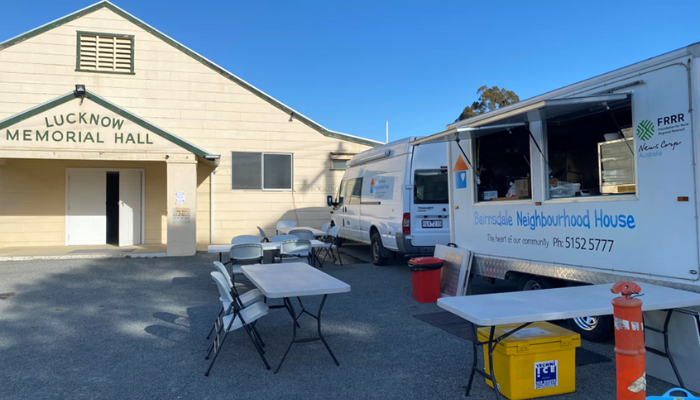
With support via FRRR through the News Corp Bushfire Fund, BNH embarked on a project to enhance their disaster response capabilities. Their original plan was to fit out a donated Ford transit van, but supplier delays caused by COVID made this impossible. Instead, they purchased a new custom built food trailer which was already in stock with another supplier. It came fitted with stainless steel benches, fridges, freezer, exhaust fans and lighting. BNH sourced hotplates and a deep fryer which were then fitted and connected by a local registered Plumber / Gas fitter. The fabulous sign writing was completed by local business.
The innovative approach considered more than just disaster recovery, with the design considering how to mobilise the trailer as a catering kitchen during other community activities. The trailer can be stationed on-site, providing sustenance to volunteers and contributing to community recovery.
“We now have a valuable resource for the community of East Gippsland that will be available in times of not only community crisis but our road to recovery over the next 10 years.”
The food trailer facilitates the distribution of essential fresh foods, meals, and catering to remote and disaster-affected areas, ensuring families and individuals receive vital support. Moreover, with the new food trailer, the donated van can continue its role in the Food Rescue program, collecting bulk food donations from local supermarkets, restaurants, and food manufacturers. These donations are then transformed into nutritious meals for individuals in crisis or provided as food hampers.
The flexibility of the food trailer and its capacity to serve the community during recovery events and planting initiatives highlight its multifaceted role in supporting the resilience of East Gippsland. Despite challenges brought about by COVID and lockdowns, the project successfully adapted to changing circumstances, ultimately enhancing BNH’s ability to respond effectively to future disasters.
Originally a resting place for passing drovers, Foster is a small town just north of the Gippsland coast. Like much of regional Victoria, Foster was hit hard by COVID, with long-lasting economic, health and social outcomes. Impacts on social connection, the need to provide food relief for the community, and the reduced ability for community groups to fundraise were all felt strongly by the volunteers at Manna Community Garden.
Established 22 years ago, Manna Community Garden strives to improve food security and social wellbeing in the community. Working closely with Manna Gum Community House, community lunches are held and meals are provided for people in need of support. Demand for these lunches and meals was heightened during the pandemic and continues today, with the need exacerbated by escalating cost-of-living pressures. The two organisations also work together to provide assistance and information via workshops on topics such as grafting and seed saving, and a community stall at the local farmers’ market.
The fire pit in the gardens is an important gathering place for community members. The facility hosts the local youth group, community lunches, evenings in the garden events and NAIDOC week activities.
Before the pandemic, fundraising efforts were underway to pay for desperately needed upgrades to the Manna Community Garden, including to the garden beds and the amenities around the fire pit. A large Christmas in July fundraiser had to be cancelled two days before it was due to be held due to lockdown orders and while local sponsorship allowed the garden upgrades to go ahead, the works around the fire pit remained unfunded. The seating was dangerous and needed replacing if the gardens were to continue to provide an important social space for the community.
The volunteers at Manna Community Garden applied for an FRRR grant to supplement their fundraising strategy and allow them to continue with these much-needed works. Through an Australian Government-funded SRC Rebuilding Regional Communities grant for $2,600, the fire pit seating was able to be upgraded. The community of Foster is now able to safely enjoy the gardens as a space to socialise, come together, learn and provide food relief for the town.
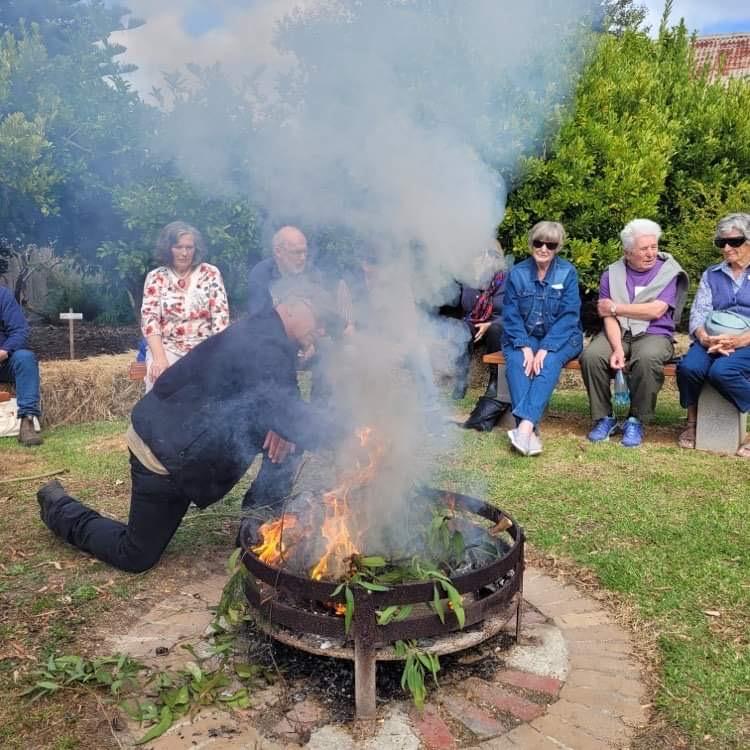

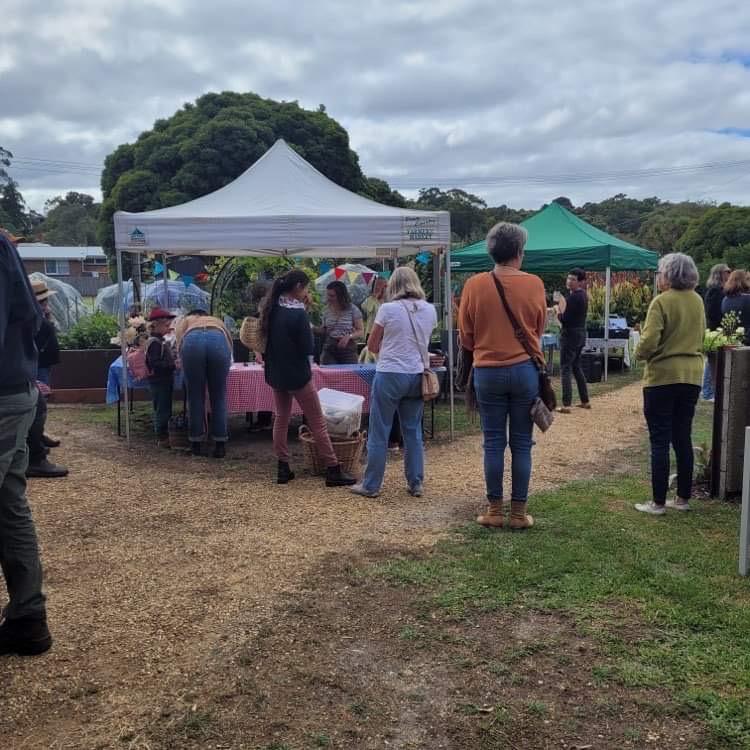
President of Manna Community Garden, Ms Juneen Schulz, explained the importance of the garden upgrades for reconnection:
“The space has provided a beautiful location for members of our community, especially our garden group, to connect. This is particularly important in the recovery from COVID-19, as it gives us a safe space to be together and rebuild our community.”
With the easing of COVID restrictions, Manna Community Garden has since joined together with other community gardens in the district to run annual events, bringing the wider South Gippsland and Bass Coast communities together and celebrating the benefits of growing locally. The first event, held in Foster in the newly renovated garden, attracted 60 guests and included workshops, guest speakers, and of course lots of beautiful locally grown produce!
“We wanted an inclusive day where community gardens across our slice of the universe could come together and discuss our favourite topics – growing food, looking after our hamlets and communities, sharing our knowledge.”
The neighbouring town of Meeniyan will host the next event, in what is hoped will be a long-running tradition – supporting communities that were badly impacted by COVID-19 to come together and encourage the health, economic, environmental, and social benefits of growing produce locally.
The work of Manna Community Garden shows that a small project can have a big, and long lasting, impact!
Local access to fresh produce in Geeveston was boosted through a SRC Small & Vital grant for the Geeveston Community House. A $9,419 grant was used to build micro plots and rejuvenate a community garden space at Scrubby Hill Farm, improving infrastructure and community access to allotments.
Three generations of community members came together for the launch of the project, celebrating with pizzas and a working bee weed blitz. The project is a testament to the tenacity of volunteers and their goal of improving local food security.
The group even bounced back after project delays last year following flooding that left a trail of destruction and debris at the farm, decimating earlier site preparation works. The community rallied together and through their hard work got the project back on track after the flood waters subsided and muddy land dried out. Volunteers constructed new garden beds, installed irrigation, fencing and signage, as well as a hot water system for safe hand washing and food handling.
The community is proud of the garden they have built and continue to maintain. The volunteers said they value the comradery that comes from working at the community garden, with one volunteer commenting, “I like doing community events like this, it makes me feel connected to people, to life and the land”.
A Strengthening Rural Communities (SRC) grant from FRRR, funded with the support of the John T Reid Charitable Trusts, helped enhance the availability of fresh fruit, as well as create more inviting, welcoming and cool streets in the remote Indigenous communities of Peppimenarti and Nganmarriyanga in the Northern Territory.
Home to the Rakpeppimenarti people, the region is inaccessible for five months every year due to annual flooding, and faces extremely high infrastructure costs due to geographic scale and terrain. It was independently measured to be the most disadvantaged in the Northern Territory, and the second most disadvantaged in Australia.
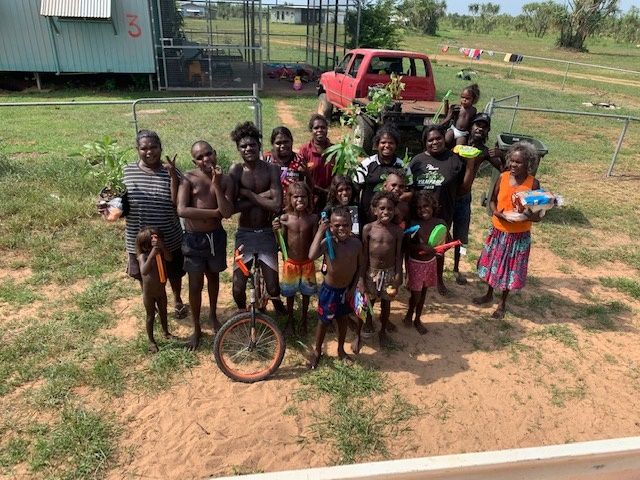
The West Daly Regional Council provides basic housing maintenance and essential municipal services to 13 homelands across 14,070 km2. While they work hard to provide high quality services to support the community, operating in a remote service delivery environment with limited financial resources is a challenge. However, they’ve identified that working with partners to improve service delivery and the quality of life for people in the West Daly region presents great opportunities.
In such extremely remote communities, food security is paramount – many of the homeland communities do not even have a shop and must travel vast distances for basic supplies. Fruit trees are a great resource in any community, as they contribute to support lifelong learning and education from Elders to young children, and promote individual and community health benefits in the form of delicious natural fruits straight from the tree, while enhancing and expanding the communities’ natural food resources.
They developed a project designed to engage community members in growing food and also create shady areas on the two homelands. In total, around 160 fruit trees and 45 shade trees were planted in designated public spaces near parks, ovals, and the local schools. The fruit trees selected included: lilly pillies, medlars, mulberries, custard apples, jaboticas, guavas, mangos and soursops. Shade trees included: native hibiscus, red coondoo, bloodwood and gum trees.
The Council used their $4,946 SRC grant to cover the costs of fruit trees and propagation powder, as well as contribute to freight – which accounted for more than 40% of the total cost of the project.
In Peppimenarti, the tree planting was done in collaboration with Peppimenarti School. About 50 trees were planted around the community with the assistance of Council Staff, CDP, Rangers, community students and teachers, totalling approximately 50 participants. A community barbeque was held after the tree planting to thank the participants for their support on this meaningful community project.
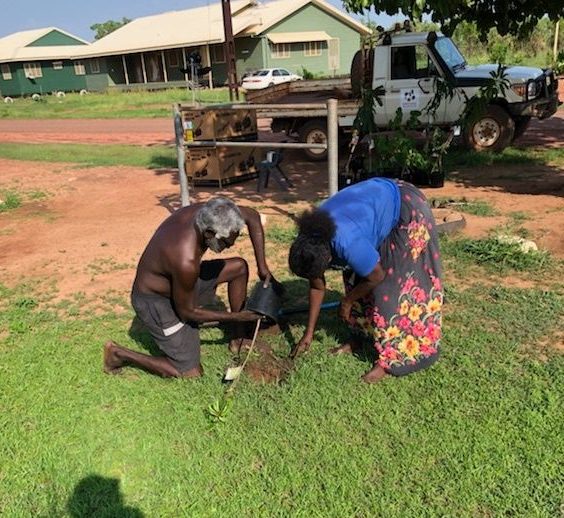
The Nganmarriyanga tree planting day was held in late December and was also a great success, with approximately 50 local men, women and children attending the activity. Trees were also provided to the residents of surrounding homelands such as Merrepen, Nemarluk, Nama and Wudapuli.
The Council provided significant in-kind support via staff labour and travel costs, and also purchased hormone rooting powder, so that cuttings can be taken which will allow further plantings. They have also assumed responsibility for ongoing plant maintenance to ensure the sustainability of the project.
Through this project, community members will gain access to healthy food grown locally, experience increased food security, and improved local plant knowledge. Further, the engagement will bring a positive impact to community spirit and local shade amenity.
“West Daly Regional Council would like to acknowledge the significant contribution of Foundation for Rural and Regional Renewal and its Donor Partner – John T Reid Charitable Trusts for the grant funding for our tree planting in Nganmarriyanga and Peppimenarti; a meaningful project that highly benefits our Indigenous Australians in our remote communities.”
Kristine Matienzo, Grants Manager, West Daly Regional Council

